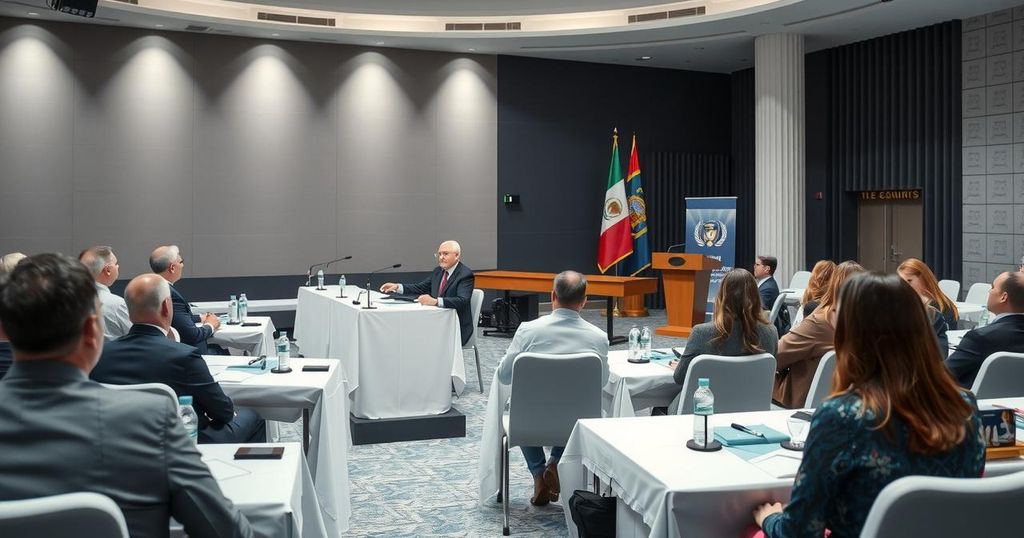Weiser Diplomacy Center Hosts Insightful Discussion on Syria’s Reconstruction

The Weiser Diplomacy Center hosted a discussion on Syria’s post-civil war reconstruction featuring Qutaiba Idlbi and Dr. Abdalmajid Katranji. They examined the results of the 14-year conflict and the new government’s strategies under Ahmed al-Sharaa. Key points included the substantial brain drain, the hope for recovery, and the need for the relaxation of U.S. sanctions to support reconstruction efforts.
The Weiser Diplomacy Center at the University of Michigan recently hosted a discussion featuring Qutaiba Idlbi, a senior fellow at the Atlantic Council, and Dr. Abdalmajid Katranji, a faculty member at Michigan State University. The session, focused on Syria’s post-civil war reconstruction, examined the last 14 years of conflict and the current state-building strategies of the revitalized Syrian government, led by Ahmed al-Sharaa since Bashar al-Assad’s regime collapsed in December 2024.
During the event, Idlbi highlighted the extensive devastation wrought by the civil war, noting the significant brain drain that has emerged. He stated, “There’s a lot for Syrians to rebuild; half of Syria has left the country,” underscoring that this exodus is one of the most substantial since World War II.
Despite the hardships, Idlbi pointed out a sense of optimism among Syrians regarding their newfound freedom from Assad’s authoritarian rule. “They are still high on joy and happiness that they finally got their country back,” he remarked, acknowledging the visible hardships faced by many.
The new leadership under Sharaa has faced criticism, particularly concerning alleged connections to Al-Qaeda. However, Katranji and Idlbi contended that Sharaa has distanced himself from these ties and is actively fighting against both Al-Qaeda and ISIS. Katranji shared his experiences from Idlib, highlighting effective local governance and community-driven relief efforts following recent earthquakes.
Contrasting his experiences in HTS-controlled Idlib with the chaos in Assad’s region, Katranji stated, “There was no structure,” emphasizing the ineffectiveness and corruption in the areas controlled by the former regime. His observations reveal a stark difference in governance and civil efforts between the two territories.
Idlbi asserted that the civil war, while devastating, has fostered an environment for Syrians to establish self-governing institutions absent under Assad. He discussed how this development differed from the U.S. experience in Iraq, where a viable replacement for the Ba’ath party was not established. “We tried to impose one model that fit all, and there was no model that fit all,” he explained.
Believing that U.S. involvement can facilitate beneficial outcomes in Syria, Idlbi stated, “I do believe in a good American role across the world,” while urging for a supportive, not dictatorial, approach to Syrian reconstruction efforts.
Katranji discussed the implications of the Caesar Syria Civilian Protection Act sanctions imposed on Syria, expressing concern over their lasting impact post-Assad. He argued for their urgent removal, stating, “If you wait too long, then another vacuum will be created.”
He emphasized that international consensus is forming around the need to relax these sanctions, as evidenced by the positions of various global actors, including the EU and the UN. Katranji concluded that engagement during this pivotal period is essential.
Responding to the event, Art & Design senior Razaan Killawi, co-president of Students Organize for Syria, expressed her appreciation for the discussion. She encouraged student engagement with ongoing reporting on Syrian affairs, noting the importance of understanding the situation from credible sources.
“The war of disinformation is a huge problem in Syria,” she remarked, urging for greater engagement from the university community.
The discussion at the Weiser Diplomacy Center illuminated the complexities of post-civil war reconstruction in Syria, highlighting both the challenges and the emerging opportunities for governance. Key speakers emphasized the need for support in rebuilding efforts while dispelling misconceptions about the new leadership. The importance of accurate information regarding the Syrian situation was also underscored, indicating a broader call for civic engagement from both the local and global community.
Original Source: www.michigandaily.com






